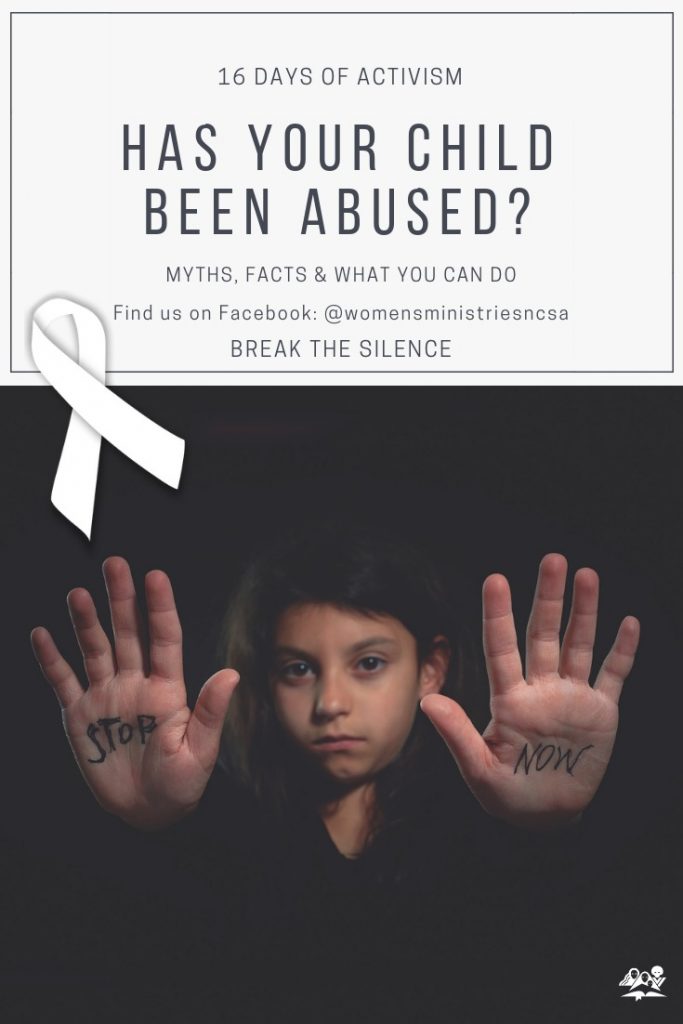Day 1 – Sunday, 25 November
Today marks the beginning of the 16 DAYS OF ACTIVISM FOR NO VIOLENCE AGAINST WOMEN AND CHILDREN. It is an International Campaign to oppose violence against women and children. It aims to raise awareness of the negative impact that violence and abuse have on women and children and to rid society of abuse. The campaign starts on the United Nations International Day for the Elimination of Violence against Women [http://www.un.org/en/events/endviolenceday/] and ends on 10 December, Human Rights Day.
Please visit our Facebook page for more info: https://web.facebook.com/womensministriesncsa
Wear a white ribbon during the 16 days to symbolize your commitment to breaking the cycle of violence against women and children.
Day 2 – Monday 26 November
What is Abuse?
To intentionally or unconsciously injure or damage someone physically, psychologically/ emotionally, or sexually, with intent to dominate, intimidate, control and/or exercise power over them. Abuse can be isolated or habitual, premeditated or spontaneous.
The one who inflicts the abuse is typically called the abuser; the one who is abused is typically called the victim.
For more info on the kinds of abuse and what the Bible has to say, please visit our Facebook page: https://web.facebook.com/womensministriesncsa
Day 3 – Tuesday, 27 November
MYTH: Victims provoke their partners’ violence.
FACT: Whatever the problems exist in a relationship, the use of violence is never justifiable or acceptable. There is NO EXCUSE for domestic violence.
Day 4 – Wednesday, 28 November
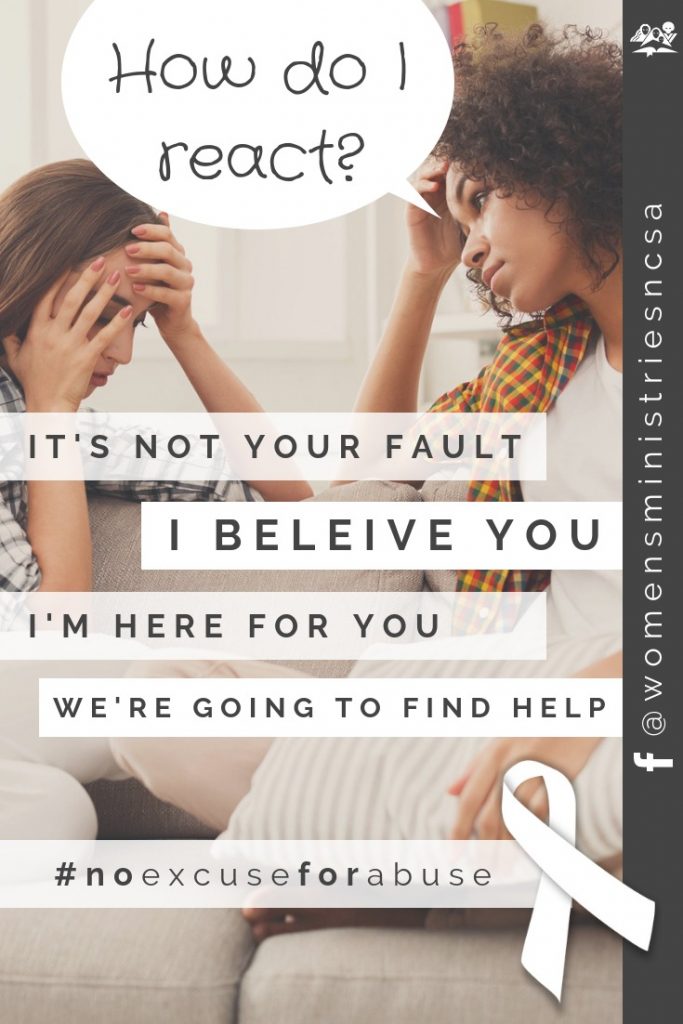
Abuse is a frightening and traumatic experience. It is very important not to blame the victim.
Avoid accusatory or dismissive statements such as:
“I’m sure he/she didn’t really mean to hurt you.” “It’s no big deal; you’ll get over it.”
“What did you do to provoke it?”
“Are you making this up?”
“Don’t tell anyone about this; it’s too embarrassing.”
Instead, use comforting statements such as these:
“I’m so sorry you had to go through this; no one should have to hurt.” “I believe you, and I know that you’re telling the truth.”
“It’s not your fault; you didn’t do anything to deserve this.”
“I’m here for you whenever you feel like sharing and praying.”
“I’m glad you confided in me; together we can find you some help.”
*Service Contact:
National Crisis Line – Counselling Service 086 132 2322*
Day 5 – Thursday, 29 November
MYTH: Domestic violence is a private family matter.
FACT: Domestic Violence is everyone’s business. Keeping domestic violence secret helps no one, has been shown to harm children, incurs substantial costs to society, and serves to perpetrate abuse through learned patterns of behavior.
Service Contacts:
Family and Marriage Society of South Africa for advice on family relations
011 975 7107
Family Ministries Department of the Northern Conference of Seventh-day Adventists
011 616 6800
Day 6 – Friday, 30 November
HAS YOUR CHILD BEEN ABUSED?
Stay calm.
• Respect the child’s privacy; find a quiet and comfortable place and carefully listen to what he/she is saying.
• Believe the child and take him/her seriously. Let the child know that the abuse was not his/her fault.
• Report the abuse to the authorities.
• Do not confront the abuser yourself.
• Take the child to the doctor for immediate medical attention.
• Find a licensed therapist who specializes in child abuse.
• Pray with the child and reassure them that Jesus loves them.
To read the full article please visit our Facebook page:
https://web.facebook.com/womensministriesncsa/
or the website: https://ncadventist.org/en/women/16-days/
Or download this brochure:
https://www-enditnow-org.netadventist.org/uploaded_assets/9082-EndItNow_Brochure_CHM_newsize_3_.pdf?thumbnail=original&1489435871
You can also contact:
Childline – Report child abuse
0800 055 555
SA National Council for Child Welfare
011 339 5741
Day 7 – Sabbath, 1 December – World Aids Day
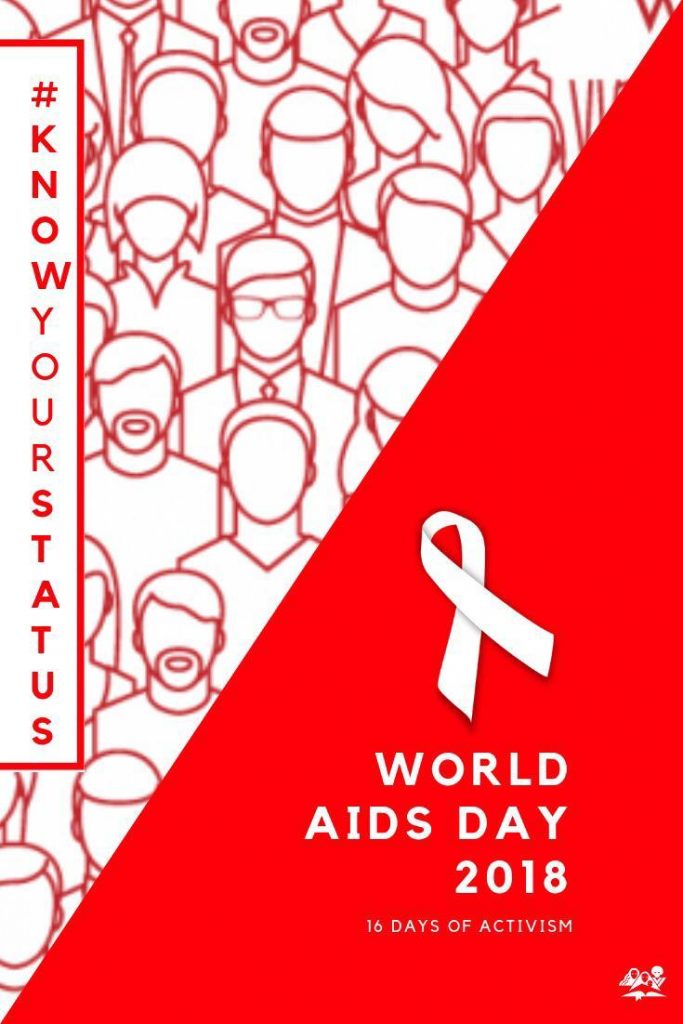
Seventh-day Adventist church members and employees have a Christian obligation to respond to and treat people suffering with AIDS as Jesus our Savior treated the sick and outcast. Tragically, the world responds to AIDS sufferers as it once did to lepers–as sinful carriers of death to be shunned and isolated. But God in Jesus gave us His response. He went out of His way, often walking for several days, just to touch and heal a person afflicted with leprosy. He always offered love, acceptance and forgiveness to those afflicted by religious pride and other sins of the day. Through His redemptive love He offered life and freedom from the burden of sin.
To read the full article, or for more info please visit our Facebook page: https://web.facebook.com/womensministriesncsa
or website: https://ncadventist.org/en/women/16-days/
Service Contact:
AIDS Helpline – 0800 012 322 / 011 725 6710
Day 8 – Sunday, 2 December
MYTH: It is easy for a victim to leave their abuser, so if he/she doesn’t leave, it means he/she likes the abuse or is exaggerating how bad it is.
FACT: Fear, lack of safe options, and the inability to survive economically prevent many victims from leaving abusive relationships. Threats of harm, including death to the victim and/or children, keep many battered women/men trapped in abusive situations. The most dangerous time for a victim is when he/she attempts to leave the relationship, or when the abuser discovers that he/she has made plans to leave.
For more info please visit our website:
https://ncadventist.org/en/women/16-days/
Service Contacts:
SAPS Crime Stop – 08600 10111
Gender-based violence command centre – 0800 428 428
STOP Gender violence helpline – 0800 150 150
/ or *120*7867# from any cell phone
Day 9 – Monday, 3 December
Battered Woman Syndrome
Battered woman syndrome is a psychological condition due to abuse, usually at the hands of an intimate partner. People experiencing battered woman syndrome may struggle to leave an abusive relationship due to fear, beliefs about the abuser’s power, and a belief that they are the cause of the abuse.
People of all genders can experience battered woman syndrome. The diagnosis uses the term “woman” because more women than men are victims of domestic violence. However, the term “battered person syndrome” is also used to refer to victims of any gender.
Battered woman syndrome is not a medical diagnosis. Instead, it describes a pattern of behavior closely related to post-traumatic stress disorder (PTSD).
People with battered woman syndrome typically show signs of PTSD related to the abuse. Those symptoms may continue even after leaving the abusive relationship. They include:
•difficulty sleeping, including nightmares and insomnia
•sudden intrusive feelings about the abuse
•avoiding talking about the abuse
•avoiding situations reminiscent of the abuse
•feelings of anger, sadness, hopelessness, and worthlessness
•intense feelings of fear
•panic attacks or flashbacks to the abuse
In addition to PTSD, people with battered woman syndrome show symptoms that may be confusing to outsiders. Those include:
•learned helplessness
•refusing to leave the relationship
•believing that the abuser is powerful or knows everything
•idealizing the abuser following a cycle of abuse
•believing they deserve the abuse
Battered woman syndrome often coincides with a cycle of abuse. The stages of the cycle of abuse include:
•Tension building: This is a period during which tension slowly builds and causes low-level conflict. The abuser may feel neglected or angry and think that these feelings justify aggression toward the victim.
•Battering phase: Eventually, the tension grows into a conflict. The abuser physically, emotionally, or sexually abuses the victim. Over time, these episodes of abuse tend to last longer and become more severe.
•Honeymoon phase: After the abuse, the abuser may feel remorse or attempt to win back the victim’s trust and affection. Some victims idealize their abusers during this period. Some abusers may also justify their abuse during the honeymoon period.
Women with battered woman syndrome or PTSD need help to get out of an abusive relationship. That may include financial support since many women are dependent on their abusers.
Leaving an abusive relationship can also have legal consequences, so some organizations offer free legal support to abuse survivors, particularly if there are children involved.
Once a person’s living situation is stabilized, they will need help to deal with the emotional and physical aftermath of abuse. Treatment may include:
•learning about battered woman syndrome and how it affects self-esteem
•psychotherapy to deal with the emotional consequences of the abuse
•medical care to treat any physical effects of the abuse
•medication to manage depression, anxiety, insomnia, and other symptoms
•joining a support group
Service Contacts:
Mental Health Information Line – 0800 567 567
Legal Aid – 0800 1110 110
Day 10 – Tuesday, 4 December
MYTH: DOMESTIC VIOLENCE/ABUSE IS USUALLY A ONE TIME, ISOLATED OCCURRENCE.
FACT: Battering is a pattern of coercion and control that one person exerts over another. Battering is not just one physical attack. It includes the repeated use of a number of tactics, including intimidation, threats, economic deprivation, isolation and psychological and sexual abuse. Physical violence is just one of these tactics. The various forms of abuse utilized by batterers help to maintain power and control over their spouses and partners.
You may be in an abusive relationship if your partner:
• Constantly accuses you of having an affair
• Bites, slaps, punches, or kicks you
• Throws things at you or breaks objects during an argument
• Belittles you in front of your friends and family
• Makes you feel afraid to express your opinions or wishes
• Monitors who you speak to and whom you go out with
• Blames you for his/her appearance
• Threatens you or swears at you
• Criticizes all you do
• Disrespects you, your family, and your friends
• Refuses to let you have your own money or handle your finances
• Forces you to have sex
• Demonstrates extreme possessiveness or jealousy
Day 11 – Wednesday, 5 December
MYTH: DOMESTIC VIOLENCE OCCURS ONLY IN POOR AND UNEDUCATED FAMILIES.
FACT: Studies of domestic violence consistently have found that battering occurs among all types of families, regardless of income, profession, region, ethnicity, educational level or race. However, the fact that lower income victims and abusers are over-represented in calls to police, battered women’s shelters and other social services may be due to a lack of other resources.
IF YOU SUSPECT SOMEONE YOU KNOW IS BEING ABUSED, YOU CAN HELP
• Call the authorities and report the abuse
• Find out about abuse prevention agencies in your area; call the Domestic Violence Hotline and initiate the help needed
• Listen without interrupting and don’t feel as though you have to offer advice
• Encourage him/her to seek professional counseling
• Don’t criticize the abuser
• Offer to be a prayer partner
• Invite him/her to join you on outings without bringing up the abuse situation
• Keep your word and frequently follow-up to see how he/she is doing
Psalms 82: 3-4 (NIV) “Defend the cause of the weak and fatherless; rescue the weak and needy; deliver them from the hand of the wicked.”
Day 12 – Thursday, 6 December
Health consequences of violence against women and girls
According to the World Health Organization, violence against women is a widespread experience worldwide with serious public health implications of epidemic proportions.
**Makila is one of 1,260 girls in Congo who die after undergoing female genital mutilation each year. Thousands more will suffer infertility or horrible physical deformities that render them outcasts, living in pain for years.
**Nancy was raped by her mother’s abusive boyfriend; this type of abuse occurs on average every 17 hours. Nancy—like thousands of other girls who have been abused—will suffer health problems throughout her life because of this trauma.
Abuse against women and girls causes physical health problems far beyond the primary or most obvious scars, either physical or psychological. Results of abuse will impact victims’ health for years. Violence against women is truly a public health concern
Abused women have higher rates of reproductive problems such as unintended pregnancies, abortions; adverse pregnancies and neonatal and infant outcomes and sexually transmitted infections (including HIV/AIDS).
Health consequences during pregnancy
Among pregnant women with a history of abuse, there is a significantly higher rate of complications during pregnancy, such as low weight gain; anemia; infections; first and second trimester bleeding; depression; suicidal tendencies; use of tobacco and/or alcohol and illicit drug use
Witnessing domestic violence
Witnessed abuse is considered by some as serious as child abuse. The physical and mental health consequences do testify to that. Children who witness domestic violence are more likely to exhibit behavioral and physical health problems including depression; anxiety; suicide attempts; drug and alcohol abuse; post-traumatic stress disorder (such as bed-wetting or nightmares); allergies; asthma; gastrointestinal problems; headaches and flu.
https://women.adventist.org/…/EndItNow_Brochure02_2012_Heal…
For more info please visit our Facebook page:
https://web.facebook.com/womensministriesncsa
or website: https://ncadventist.org/en/women/16-days/
Day 13 – Friday, 7 December
Relationship and Dating Violence
Teen dating abuse is a pattern of abusive behavior used to have power and control over another person. Teens who abuse their girlfriends or boyfriends do the same things as adults who abuse their partners. Teen dating violence is just as serious as adult domestic violence. And it’s common. It can be:
• Any kind of physical violence or threat of physical violence to gain control.
• Emotional or mental abuse, such as playing mind games, making you feel crazy, constantly texting you, or constantly putting you down or criticizing you.
• Destroying your homework.
• Deciding what school activities in which you can participate.
• Sexual abuse, including making you do something you don’t want to do, or making you feel badly about yourself sexually. Threatening to rape you.
Effects of relationship and dating violence
Abusing self (cutting); Difficulty in making decisions Inability to concentrate; Poor communication skills; Loss of self-confidence; Nightmares; Scared; Guilt; Insomnia; Withdrawal; Anger; Promiscuity; Paranoia; Insomnia; Shame; Depression; Anxiety; Aggression and Eating disorders.
Myths and attitudes of the abuser:
“A guy needs to be in control of the relationship.”
“Some girls ask for it, that’s why they stay.”
“The girl is to blame when the guy hits her.”
“When a guy gets angry, he can’t help it.”
“It’s understandable to hit her; maybe next time she’ll learn not to make me angry.”
Myths and attitudes of the victim:
“I love him. I’m the only one who can help him.”
“I shouldn’t have nagged him.”
“It was my fault he got angry.”
“If I change, he’ll change.”
Service Contact:
Crisis Line – 0800 567 567
https://women.adventist.org/…/EndItNow_Brochure04_2017_Rela…
For more info please visit our Facebook page:
https://web.facebook.com/womensministriesncsa
or website: https://ncadventist.org/en/women/16-days/
Day 14 – Sabbath, 8 December
Struggling to forgive one who abused you?
Forgiveness is a choice:
• Christ modeled forgiveness at the cross.
• God invites us to forgive others as He forgave us.
• Forgiveness enables us to break out of the prison if hate.
• Forgiveness enables us to stop mentally replaying the bitter past.
• Forgiveness enables God to heal our brokenness.
• Forgiveness allows the Holy Spirit to replace anger in our heart.
Forgiveness…. is NOT:
• Condoning – forgiveness is not justification for wrongdoing.
• Reconciliation – to forgive does not mean that you must re-establish an intimate relationship
• Minimizing – forgiveness does not lessen the offense.
• Pardoning – forgiveness does not suggest that the offender is released from legal or relational consequences of his or her actions.
• Response – forgiveness is our God-given initiative, not predicated on the abuser’s confession and repentance.
A touch of mercy – “We ourselves are erring and need Christ’s pity and forgiveness, and just as we wish Him to deal with us, He bids us deal with one another.”
A touch of grace – Colossians 3:13 “Bear with one another and forgive whatever grievances you may have against one another. Forgive as the Lord forgave you.”
This is difficult, but important. If you refuse to forgive, you will be hurting only yourself. Remember that you did not deserve forgiveness, but Jesus forgave you by grace; likewise, an abuser does not deserve your forgiveness, but you can choose to forgive anyway.
When you forgive, you are not saying that the hurt is not real, or that it even didn’t matter, or that you will put yourself in a position where you might be harmed again. Leave your hurt with God, and allow Him to comfort you and heal you.
Psalms 55:22 “Cast your burdens upon the Lord, and He will sustain you.”
For more info please visit our Facebook page:
https://web.facebook.com/womensministriesncsa
or website: https://ncadventist.org/en/women/16-days/
Day 15 – Sunday, 9 December
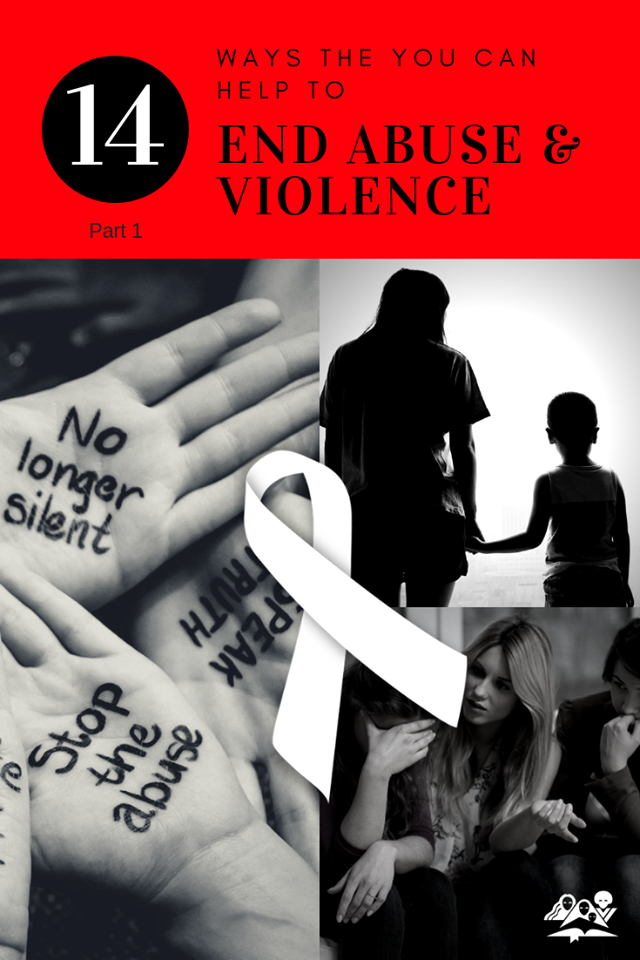
Seventh-Day Adventists affirm the dignity and worth of each human being and decry all forms of physical, sexual and emotional abuse and family violence.
What can your local church do to help prevent violence against women and children?
Suggestions and ideas for the involvement of the local congregation in abuse awareness and End It Now events [Part 1]:
1. Ask the pastor or some other qualified person to preach a sermon on violence prevention.
2. Ask those who have the main prayer during the worship service to pray for those in the congregation who are abused.
3. One small but vital principle the church must apply is that of confidentiality. It is imperative that any victim of gender-based violence may speak with an appropriate church leader in total confidence. If there is ever a situation in which the church leader is required to report to law enforcement or other appropriate authorities, s/he will disclose this to the person seeking counsel or assistance, and will treat the matter with utmost care and discretion. The victim’s safety is of supreme importance.
4. Recognize that gender-based violence is a tremendous evil, that it is never acceptable and cannot be condoned.
5. Compile complete, up-to-date information about all resources in your community available to victims of any type of gender-based violence. Make sure the information is easily available to members and others. Get acquainted with shelters and referral sources to learn what services they offer and when they are open.
6. Collect funds and provide your church leaders with educational materials on gender violence.
7. Create a church lending library of materials on gender-based violence issues relevant to your community so members and leaders may become educated on this vital topic.
https://women.adventist.org/enditnow-what-can-my-local-chur…
Day 16 – Monday, 10 December
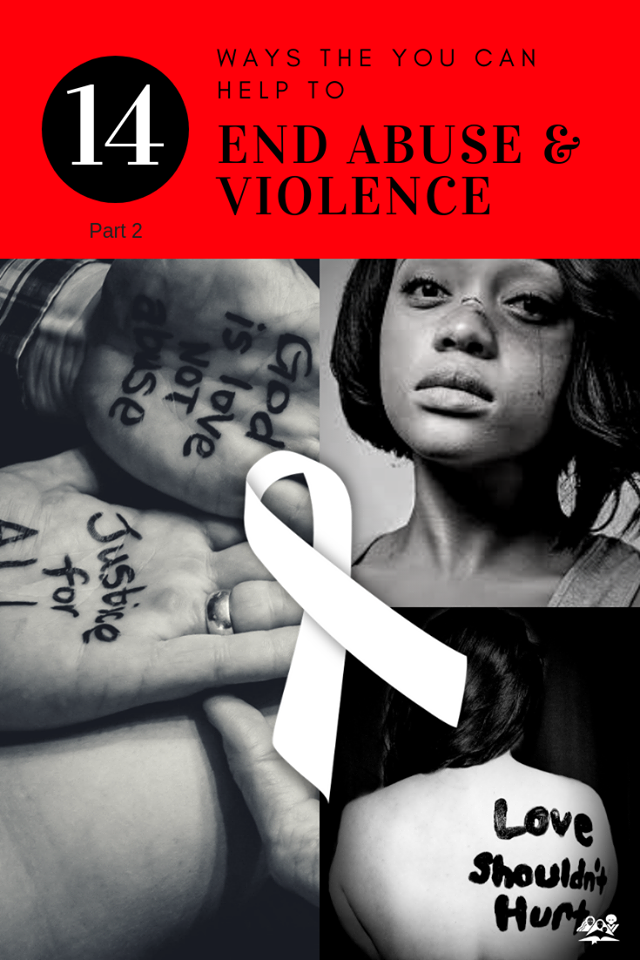
Seventh-Day Adventists affirm the dignity and worth of each human being and decry all forms of physical, sexual and emotional abuse and family violence.
What can your local church do to help prevent violence against women and children?
Suggestions and ideas for the involvement of the local congregation in abuse awareness and End It Now events [Part 2]:
1. Organize a group to assess the needs in the local community. What is one need your group can address that may help reduce gender-based violence?
2. Create one or more “safe houses” where abuse victims can find emergency shelter.
3. Present sermons and workshops to the congregation and the community on issues of gender-based violence relevant to your community. Offer to present age-appropriate information in local schools.
4. Examine church policies and practices to be sure none foster or encourage hurtful or discriminatory attitudes towards women.
5. Provide ongoing support to a local women’s shelter or other organization benefitting victims of gender-based violence.
6. Care for hurting people in our church. Be non-judgmental. Develop support groups.
7. Help raise awareness. Share materials about gender-based violence with your community.
https://women.adventist.org/enditnow-what-can-my-local-chur…
